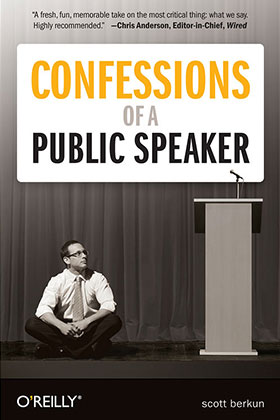How to Prepare: a Checklist For Great Talks
February 1, 2011
To help celebrate the recent release of the paperback edition of Confessions of a Public Speaker, as well as it’s 100th review on amazon.com, here’s a checklist you can use to help make sure things go well at your next presentation.
You can download a nice printable PDF of the checklist:
Before the event
- Questions to ask to prepare:
- Who is the audience? Why are they coming?
- Can organizer provide demographics?
- Can you look at last year’s programs? Were there reviews of the event on blogs?
- What are other speakers speaking about?
- Will this be a keynote lecture (more scripted) or small (more interactive)?
- Create a list of questions audience will want answered in the talk
- Prioritize the list and sketch out stories / ideas / points
- Budget at least 10x time to prepare ( 1 hour talk will take roughly 10 hours of preparation)
- Develop ten minutes of rough draft material
- Practice the ten minutes. Do not procrastinate.
- Revise material when it doesn’t work, then practice again from beginning. Repeat as necessary. (See Chapter 5 of Confessions for a full description of how I prepare)
- Do a test run in front of people who will give honest feedback (Or videotape and watch).
- Practice with a clock with goal to end reliably with an extra 5 minutes.
- Ask for emergency contact cell phone#, give organizer yours
- Get directions to the venue, including office-park insanity, and within building insanity
- If appropriate, post slides to web, include URL at end of talk
Leaving for the event
- Get an hour of exercise that morning or night before.
- Check laptop: do you have all cables? Is it working fine? Are slides on it? Battery charged?
- Bring backup slides on flash drive / Extra-backup online somewhere / Print back-up of slides
- Bring remote control: Check battery
- Shower, shave, prune, scrub, brush, deodorize
- Ensure you avoid all avoidable stress (get there early no matter what)
At the event
- Register and let organizer know you’ve arrived (txt message if necessary)
- Find your room and watch another speaker speak in it. Notice anything?
- If time allows, mingle and meet people who might be in your audience
- Return to room to catch (at least) tail end of last speaker before you – maximize time to set up.
- Get laptop hooked up to projector immediately. Most problems occur here.
- Find tech person, or call organizer – you’ll need their help to get microphone set up, or to deal with any tech issues.
- Test remote. Test any fancy videos or fancy anything.
- Walk the stage. Get your body comfortable with the room. Run through your first few slides or minutes and ask someone to look at you, your clothes, and your slides to flag any issues.
- Make sure you have a glass of water or preferred beverage at the lectern.
- Sit in the back row for a few seconds, and imagine yourself on stage. Also check that the text on your slides is readable from back there.
- Relax. You’re prepared and all set. Nothing left to do. Nothing you do now will change anything. Either you prepared well or you didn’t. Enjoy the ride.
- If needed, distract yourself by going for a walk or other physical activity
After the event
- If a speaker follows you in the room, get out of their way so they can get set up
- Make yourself visible so people can find you to ask questions about your talk
- Write questions from attendees on their business cards so you can answer in email later
- Post slides online or to slideshare if appropriate
- Email people who gave you their cards, answering their questions
- Thank the organizer and ask for any feedback (positive/negative)
- If your talk was videotaped, ask for a copy so you can watch and improve.
- Have a beer
If you’re a frequent speaker, what else would you add? What might you remove? (Keep in mind, good checklists are short and smart)
Like this advice? There’s much more:
Read the national bestseller, with behind-the-scenes tales from the life of a successful public speaker, teaching you the inside view of how to be a great communicator. Recommended by the Wall Street Journal, Lifehacker, Wired and other media. Buy on Amazon / Read a free chapter
Posted in Public Speaking


